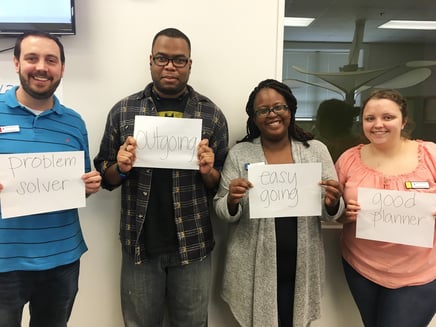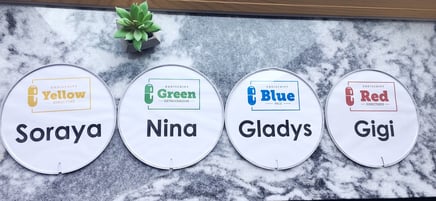Think about your friends and coworkers for a minute: What qualities do they have that you like and dislike? Which qualities mesh well with your personality and which do not? We are surrounded by people who are like us and some who are just our total opposite. Sometimes it works, sometimes it doesn't. Relationships take effort to maintain. To know yourself and to know others' tendencies are great ways to accomplish goals and maintain a high level of satisfaction both personally and in the workplace.
Defining Personality and TraitsPersonality is the set of characteristics that underlie a relatively stable pattern of behavior in response to ideas, people, and objects. Traits are distinguishing personal characteristics that make up an individual's unique personality.
What is "The Big Five"?
For many years, researchers have built theories that explain and classify the complex topic of human personality, motivation, and behavior. Gordon Allport's Trait Theory of Personality, Raymond Cattell's 16 Personality Factor Model, and Carl Jung’s Personality Theories are some examples.
Researchers and psychologists suggest that most personality tests have recurring themes/dimensions known as "The Big Five.” The Big Five personality dimensions by Robert McCrae and Paul Costa were built upon Lewis Goldberg's five primary personality factors. In their research, they classified traits into five broad dimensions: openness, conscientiousness, extraversion, agreeableness, and neuroticism. You can remember them by using the acronyms OCEAN or CANOE.
Openness - Describes an individual's openness to experience. A high score of this trait is great in a fast-growing company where there are many changes and ambiguity. The mid scorers tend to be great as well as they are usually open-minded but also practical and level-headed. Pay attention to the very low end of the spectrum as individuals who scored low may be resistant to change and can hinder innovation and progress.
high - inquisitive, creative, curious, unconventional, imaginative, likes to take on new challenges, adventurous
medium - open to change but also appreciates tried-and-true methods
low - straightforward, prefers familiarity, may not express emotions openly, down to earth
Conscientiousness - The degree to which a person is characterized by dependability, efficiency, and purposeful action. This dimension is a good predictor of successful individual performance in the workplace.
high - organized, likes routine and plans, disciplined, goal-oriented, thorough, methodical, detail-oriented, can be a compulsive perfectionist
medium - prefers structure but can be flexible, cares about details and accuracy if he or she finds the situation important
low - spontaneous, flexible, more relaxed, multitasker, tends to be careless, may procrastinate
Extraversion - Refers to a person's comfort level with his or her environment. A person high in extraversion is usually comfortable talking with new people. He or she likes to look at the big picture and is a successful influencer. This trait is usually seen in many CEOs and entrepreneurs.
high - action-oriented, risk-taker, energetic, assertive, outgoing
medium - can easily shift from working in a team to independently
low - task-oriented, reserved, relaxed pace, likes to keep to themselves, quiet, private
Agreeableness - Measures how well a person gets along with others, competitiveness, and cooperation. People who scored high in this spectrum are empathetic and work well in a team. Highly agreeable individuals may thrive in roles that may involve counseling, social work, and leadership. On the negative side, a highly agreeable person may conform to groups, perhaps to avoid disagreements and/or to fit in. A mid scorer will likely bring up hard topics and be more assertive in situations that require decision-making.
high - dislikes confrontation, compassionate, helpful, considerate, tolerant, and selfless
medium - looks out for both self and others, strategic, can be assertive if he/she strongly believes in a cause
low - guarded, makes objective judgments, direct communication style, may be self-focused, persistent, doubtful, uncooperative, may be combative
Neuroticism - Measures a person's emotional stability. High neuroticism can lead to issues in the workplace. But just because an individual scored high in neuroticism, doesn't mean they should be disregarded completely. The concern is more about the type of job that he or she will be performing. For example, a person who scored high in neuroticism may not do well working as a server in a busy restaurant but may thrive working in a quiet, slower-paced setting such as in a library. Some people who get easily stressed handle their stress well and use it as a motivator to get their tasks accomplished.
high - emotionally reactive, temperamental, insecure, tends to stress out easily, self-conscious, can be a perfectionist
medium - usually able to handle and control emotions under normal stress
low - calm, poised, relaxed, can handle stressful situations well

What are the benefits of taking personality tests?
- Self-reflection and increase self-awareness
- Assess your strengths and weaknesses
- Identify career possibilities
- Identify what focus you want to pursue in college
Why do personality tests matter in the workplace?
- Job placement
- Employee development and career planning
- Culture fit
- Employee satisfaction and motivation
- Reduce turnover and lower the cost of poorly-matched hires
- Helps us learn to understand our team members

Understanding yourself and those around you, especially your coworkers, is crucial to achieving goals and ramping up your productivity. Here are some free personality tests to help you get started:
Do you want to know more about Management By Strengths? Equiscript patient enrollment specialist and MBS trainer, Tekoa Christopher, has provided us with an overview. Check it out here!
 Gladys Osea, Human Resources and Finance Analyst
Gladys Osea, Human Resources and Finance Analyst


